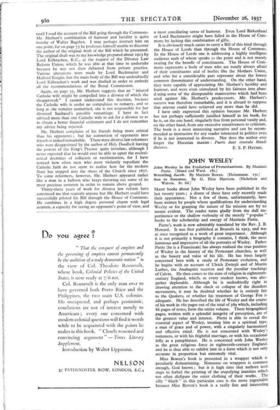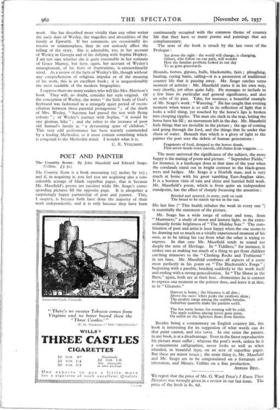JOHN WESLEY
John Wesley in the Evolution of Protestantism. By Maximin Piette. (Sheed and Ward. 18s.) MANY books about John Wesley have been published in the last twenty years ; a dozen of these have only recently made their appearance. Not a few of them, unfortunately, have been written by people whose qualifications for understanding Wesley or for grasping the nature of his mission are by no means evident. The reader turns gladly from the dull im- pertinence or the shallow verbosity of the merely " popular " books to the scholarship and energy of Maximin Piette.
Piette's work is now admirably translated by the Rev. J. B. Howard. It was first published at Brussels in 1925, and was at once recognised as a work of great importance. Although it is not primarily a biography it contains, I think, the most luminous and impressive of all the portraits of Wesley. Father Piette (he is a Franciscan) has always realised the true position of Wesley in the history of the Protestant churches, as well as the beauty and value of his life. He has been largely concerned here with a study of Protestant evolution, and he begins with an account of Ulrich Zwingli and of Martin Luther, the Anabaptist reaction and the peculiar teachings of Calvin. He then comes to the state of religion in eighteenth- century England, which, as every student knows, was alto- gether deplorable. Although he is undoubtedly right in drawing attention to the check or collapse of the dissident movements, it may be doubted whether he is entirely fair to the Quakers, or whether his treatment of George Fox is adequate. He has described the life of Wesley and the course of his work in 18o pages out of the total of 569 which, including 86 pages of notes, form the entire volume. These biographical pages, written with a splendid integrity of perception, are of the greatest value and interest. Piette is able to reveal the essential aspect of Wesley, treating him as a spiritual type, a man of grace and of power, with a singularly harmonised and effective mind. He is not concerned with Wesley's romances, or with his frightful marriage, or with his occasional folly as a pamphleteer. He is concerned with John Wesley as the great religious force in eighteenth-century England, and he is thus able to exhibit him in a form which is not only accurate in proportion but extremely vital.
Miss Bowen's book is presented in a wrapper which is peculiarly disheartening. Nonsense on wrappers is common enough, God knows ; but it is high time that authors took steps to forbid the printing of the stupefying inanities which to6 often disfigure the outer clothing of their works. The silly " blurb " in this particular case is the more regrettable because Miss Bowen's book is a really fine and interesting
work. She has described more vividly than any other writer the early days of Wesley, the tragedies and absurdities of the family at Epworth. If her comments are occasionally in- trusive or commonplace, they do not seriously affect the telling of the story. She is admirable, too, in her account of Wesley in Georgia and of his dallying with Sophia Hopkey. I am not sure whether she is quite reasonable in her estimate of Grace Murray, but here, again, her account of Wesley's entanglement, of his fears or frustrations, is extraordinarily vivid. As a review of the facts of Wesley's life, though without any comprehension of religious impulse or of the meaning of his work, this is an excellent book ; it is unquestionably the most readable of the modern biographies.
I suppose there are many readers who will like Mrs. Harrison's book. They will, no doubt, consider her style original. Of the conception of Wesley, she writes " the little body of God's firebrand was fashioned in a strangely quiet period of recon- ciliation between those parental protagonists " ; of the death of Mrs. Wesley, " Susanna had passed the test with flying colours " ; of Wesley's journey with Sophia, " it would be one glorious hike " ; and she refers to the increase of poor old Samuel's family as " a devastating spate of children." This very odd performance has been warmly commended by a leading Methodist, so it must contain something which is congenial to the Methodist mind. I wonder what it is.
C. E. VULLIAMY.















































 Previous page
Previous page